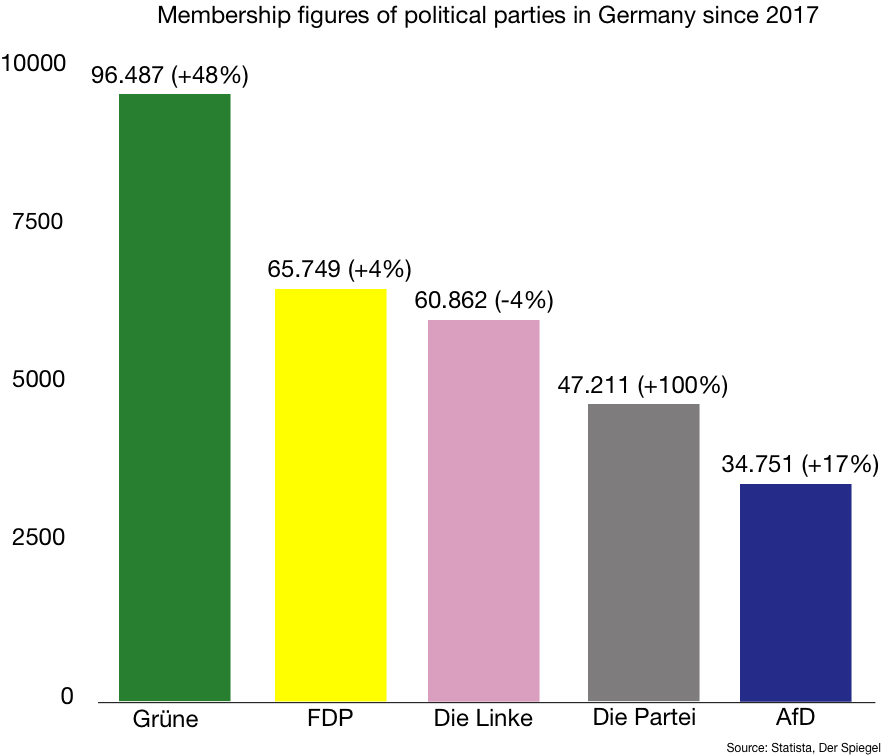It started as a joke...
This newsletter is a 4-minute read

Martin Sonneborn - a real politician? © imago images / Jochen Eckel
Riding high on successes in North Rhine-Westphalia's municipal elections last month, the party now finds itself at a crossroads. Realists say the future lies in moving into the mainstream. But purists insist the party shouldn’t forget how it started - as a joke.
While this might sound like an apt description for the Greens, we’re actually talking about the Party for Labour, Rule of Law, Animal Protection, Promotion of Elites and Grassroots Democratic Initiative. In short - Die Partei.
Martin Sonneborn hit the right tone when he founded Die Partei 16 years ago. Promising to invade Liechtenstein and give every voter a unicorn, he convinced thousands of people to join up in a matter of months.
A former editor of the satirical magazine Titanic, Sonneborn makes no bones about his leftist views. But in more innocent times, Die Partei became a release valve for voters across the spectrum who wanted to blow a raspberry at Berlin.
An early accomplishment was a “state visit” to Georgia, where they tricked the leader of the opposition into signing a cooperation agreement in front of rolling TV-cameras.
At the ballots though, success was initially limited. In the 2013 federal election, they didn’t even score one percent.
But there’s always the EU. In 2014 the pranksters won enough votes for their leader to sneak into Brussels.
The sleepy Brussels plenary chamber became the perfect arena for Sonneborn, who was awarded a TV-slot by der Spiegel, which he used to ridicule the EU in front of a mass audience.
Sonneborn’s star rose, as did party membership. If the current trend continues, Die Partei will soon overtake both die Linke and the FDP. Incredibly, they now have more members than the official Bundestag opposition - the AfD.

Success continued at the European elections in 2019, when Die Partei quadrupled its vote count. In some districts, Sonneborn was even ahead of the CDU. The reward was a second seat and more speaking time.
But now Sonneborn wants to get serious. Whether it’s hubris or he can’t find enough clowns to put on his electoral lists, he made clear in a recent interview with der Spiegel that he intends to abandon his purely satirist roots and move into “real politics.”
“You can’t achieve much if you’re always a clown. You won’t get many votes that way,” agrees Timo Gätzschmann, whose 10% of the vote in his municipality in North Rhine-Westphalia beat even the SPD.
It's hard to argue against a bit more humour in German politics, but a closer look at Die Partei shows it’s not all fun and games.
Last year, 100 members sent a letter to their leader asking him to stamp down on sexual harassment. In one instance, a member had her skirt pulled down at a gathering. In another, Sonneborn himself attempted to stop a police complaint against a politician by telling the victim that it “would only create more problems” if she reported the man for physically molesting her.
Despite the seriousness of the allegations, Sonneborn quipping that people who can’t keep their fingers to themselves should join the CDU instead.
Such accusations are bad enough for any party, but even worse for one whose Markenzeichen is lambasting the hypocrisies of the establishment.
Browsing through the plethora of slogans and placards which Sonneborn and his team have produced over the years and, considering the fact that 80% of the party’s members are men (most of them of the same generation as the 55-year old Sonneborn), a clear picture emerges:
“MILFS against Merkel”
“More pornography in politics”
“Mandatory nudity for women between 18 and 25”
“#Grabtoo, sexual harassment for all!”
“More beer, more sex, more money!”
Mr Sonneborn’s most controversial prank came in 2011 when he mocked the hysteria that accompanied Obama’s state visit by appearing on billboards in blackface beneath the tagline “Ick bin ein Obama”.
“Soon enough you’ll only be able to joke about deserts and undiscovered planets so as not to offend anyone,” he complained in an interview with the Berliner Zeitung this August, before berating the “17-year-olds” who dare to criticize his “art”.
But is today’s youth as humourless and oversensitive as the seasoned satirist claims, or is he just out of touch?
The popularity of another comedian Jan Böhmerman - ten years Mr Sonneborn’s junior and also solidly left-leaning - speaks for the latter. Böhmerman is far from immune to scandal, but he pulls off brazen provocation without offending women and and minorities.
While no one believes Die Partei stands a chance of entering the Bundestag next year, pollsters think Sonneborn’s frat boy jokers have a shot at entering Berlin’s Senate. And Sonnenborn’s trick of combining a “serious” political agenda with ridicule gives him an unfair advantage - how do you argue with an opponent who can always hide behind satire if a slogan misfires?
Come to think of it, Die Partei’s playbook is not all that different to that of the right-wing AfD: make headlines with provocative slogans, then claim your opponents are taking it out of context.
Rather than trying to find out if there’s room for misogynist left-wing humour in the vacuum created by the Greens and the dusty Linke party, perhaps Mr Sonnenborn should stop the joke before it goes too far…
A.B.B
Get the best analysis and insights on Germany straight into your inbox!
Who we are:
Jörg Luyken: Journalist based in Berlin since 2014. His work has been published by German and English outlets including der Spiegel, die Welt, the Daily Telegraph and the Times. Formerly in the Middle East.
Axel Bard Bringéus: Started his career as a journalist for the leading Swedish daily Svenska Dagbladet and has spent the last decade in senior roles at Spotify and as a venture capital investor. In Berlin since 2011.


